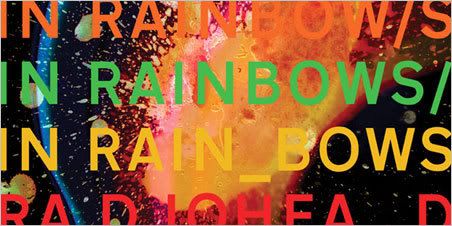
“All I Need“
from the album In Rainbows
2007
iTunes
It’s either the cleverest marketing scheme in years or, just maybe, a far-reaching social experiment designed to test our morality.
Radiohead seems entirely capable of hatching either, which makes the release yesterday of the English band’s new album In Rainbows all the more fascinating.
The gist: Having fulfilled the terms of its record deal with Capitol, Radiohead decided to release In Rainbows on its own, as a digital download available exclusively through its website, and to let fans assign value to the band’s art. In other words, they’re charging you whatever you’re willing to pay — and letting you have In Rainbows even if you’re not willing to pay a cent. (The band is also offering a fancy “discbox” edition of the album, complete with vinyl records, a bonus CD of unreleased songs, and artwork. That one’s not free: Radiohead is charging 40 British pounds — about $82 — for the discbox, which ships in December.)
It’s not the first time an act has made its music available online essentially for free — the Chicago band Wilco streamed Yankee Hotel Foxtrot on its website after Reprise refused to release the album and dropped the group in 2001. But Wilco’s sudden free-agent status was involuntary, and the band quickly secured another record deal, releasing Yankee Hotel Foxtrot on Nonesuch in April 2002.
Radiohead chose to go it alone, and the implications are potentially huge for an industry still dominated by foundering major record labels that haven’t figured out how to make the Internet profitable for themselves. Their role as musical intermediary has probably never been as threatened as it is now that a prominent band has seen fit to cut out the middle man altogether and deal directly with its fans.
There are caveats, of course. As one of the biggest acts in the world, Radiohead doesn’t need the money. It also doesn’t need the publicity, thanks to the unique way the band is offering In Rainbows and its huge, devoted fan base, which serve as self-fulfilling marketing tools. Most bands aren’t in such an advantageous position, though they’d probably like to be: Radiohead has earned the enviable luxury of being able to focus on the artistic side of its music.
And such artistry.
In Rainbows, the band’s seventh studio album and first since 2003’s Hail to the Thief, is dense and thorny, complex and beautiful. The songs are a skillful mix of instruments and electronic sounds, incorporating elements of all the things Radiohead has done before without sounding exactly like any of them. Jittery rhythm adds a nervous, tribal edge to “15 Step,” and elegant strings swirl through “Faust Arp,” one of many songs on the album that establishes a base line of sound from which simple melodic lines seem to magically appear. It’s piano on “All I Need,“ emerging from behind the low buzz of a synthesizer and building as part of a massive crescendo, and it’s singer Thom Yorke’s voice on “House of Cards,” echoing among shards of electronic chaff while a steady guitar part thrums behind it all.
Yorke has explored themes of alienation and paranoia from Radiohead’s beginnings, and In Rainbows is no exception. Yet his dark ruminations reach at times for redemption here, whether he’s crooning in his keening falsetto or singing in murmurs and sighs behind a curtain of luminous sound.
So, how much is it all worth?
Maybe that’s the test, to see whether people are willing to place intrinsic value upon something Radiohead took the trouble to offer for free. It’s a strange sort of honor system, if that is indeed what the band is doing, but the ultimate truth of the matter is this: In Rainbows is worth whatever you paid for it.



The “choose what you want to pay” thing has to be one of the coolest things I’ve seen a band do. Now, I did try putting in 0 for the price and sure enough – it worked… but for the record, I’m planning on going back to put in something more like the equivalent to the “normal” price of an album.
I think it is an interesting experiment – I’m willing to bet they’d make more money with this than what they’d make from the RIAA.